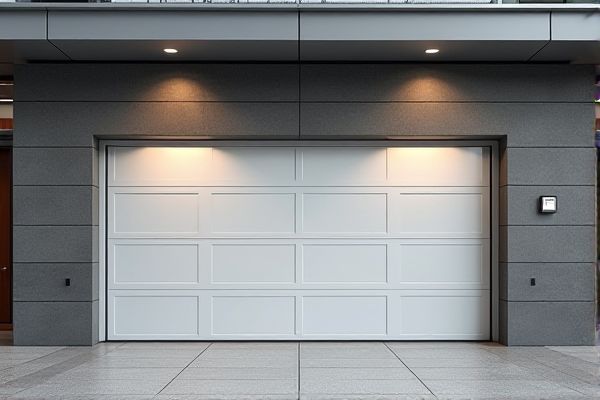
Automatic garage doors offer convenience, security, and ease of use with remote operation and smart technology integration, while manual garage doors require physical effort and lack advanced features. Discover which option suits your lifestyle and needs by reading the rest of the article.
Table of Comparison
| Feature | Automatic Garage Door | Manual Garage Door |
|---|---|---|
| Operation | Electric motor with remote control | Manual lifting and lowering |
| Convenience | High - hands-free, quick access | Low - requires physical effort |
| Installation Cost | Higher - motor and sensors included | Lower - basic mechanical parts only |
| Maintenance | Requires periodic motor and sensor checks | Minimal - occasional lubrication |
| Safety | Built-in sensors prevent accidents | Depends on user caution |
| Power Dependency | Requires electricity or backup battery | No power needed |
| Durability | Moderate - motor wear possible | High - simple mechanical parts |
| Security | Enhanced with automated locking systems | Basic mechanical locks |
Introduction to Garage Door Types
Automatic garage doors incorporate motorized mechanisms that enable remote operation, enhancing convenience and security through features like keyless entry and timer-based closing. Manual garage doors require physical effort to open and close, typically featuring simpler designs and lower initial costs but lacking advanced safety and automation benefits. Choosing between automatic and manual options depends on factors such as budget, ease of use, maintenance requirements, and desired functionality.
Key Differences Between Automatic and Manual Garage Doors
Automatic garage doors operate using electric motors and remote controls, providing convenience and enhanced security with features like automatic locking and sensor detection. Manual garage doors require physical effort to open and close, offering lower initial costs but less user convenience and fewer safety features. The key differences lie in operation method, security level, and maintenance requirements, with automatic doors demanding regular electrical system upkeep compared to the simpler mechanical maintenance of manual doors.
Installation Process Comparison
Automatic garage door installation requires precise electrical wiring and sensor calibration, often needing professional expertise to ensure safety and functionality. Manual garage doors have a simpler installation process, primarily involving mounting hardware and balance adjustments, which can be completed by homeowners with basic tools. Choosing an automatic system increases initial setup complexity but adds convenience and enhanced security to Your garage.
Cost Analysis: Automatic vs Manual Garage Doors
Automatic garage doors typically cost between $1,200 and $2,500, including installation, while manual garage doors range from $300 to $700. Maintenance and repair expenses for automatic doors can add $100 to $300 annually due to motor and sensor upkeep, whereas manual doors incur minimal costs. Long-term energy savings and convenience of automatic doors may offset the higher initial investment compared to manual options.
Convenience and Ease of Use
Automatic garage doors provide unmatched convenience by allowing you to open and close your garage remotely with a keypad, smartphone app, or remote control, eliminating the need for physical effort. Manual garage doors require you to lift and lower the door by hand, which can be cumbersome and time-consuming, especially in bad weather or during emergencies. Choosing an automatic garage door enhances ease of use and improves daily accessibility, making it a preferred option for busy homeowners.
Maintenance Requirements and Longevity
Automatic garage doors require regular maintenance of electronic components, sensors, and motor systems to ensure smooth operation, with professional inspections recommended every 6 to 12 months. Manual garage doors have fewer mechanical parts and typically need only occasional lubrication and hardware checks, resulting in lower maintenance costs. In terms of longevity, manual doors often last longer due to their simpler construction and fewer moving parts, whereas automatic doors may experience wear on motors and sensors, potentially reducing their lifespan.
Security Features and Safety Levels
Automatic garage doors offer advanced security features such as rolling code technology that changes access codes with every use, reducing the risk of unauthorized entry. Manual garage doors rely primarily on physical locks, which can be more vulnerable to tampering and forced entry. Your safety is enhanced with automatic doors that often include sensors to prevent accidents, whereas manual doors lack these built-in safety mechanisms.
Energy Efficiency Considerations
Automatic garage doors typically offer better energy efficiency due to improved insulation and tighter seals that reduce heat loss compared to manual doors. Your home benefits from minimized energy waste as automatic doors help maintain consistent indoor temperatures, lowering heating and cooling costs. Manual garage doors often lack advanced insulation, making them less effective at preventing drafts and energy leakage.
Suitability for Different Home Styles
Automatic garage doors suit modern and contemporary home styles, offering sleek designs and enhanced convenience through remote operation. Manual garage doors fit traditional or rustic homes, providing a classic look with straightforward functionality and lower installation costs. Your choice depends on the architectural aesthetics and your preference for technology integration or simplicity.
Choosing the Right Garage Door for Your Needs
Automatic garage doors offer enhanced convenience and security with remote access and smart home integration, making them ideal for frequent use and tech-savvy homeowners. Manual garage doors provide a cost-effective and simple solution, suitable for garages with less daily traffic or budget-conscious buyers. Evaluating factors like usage frequency, budget, security preferences, and maintenance requirements ensures selecting the right garage door that aligns with your lifestyle and needs.
 homyna.com
homyna.com